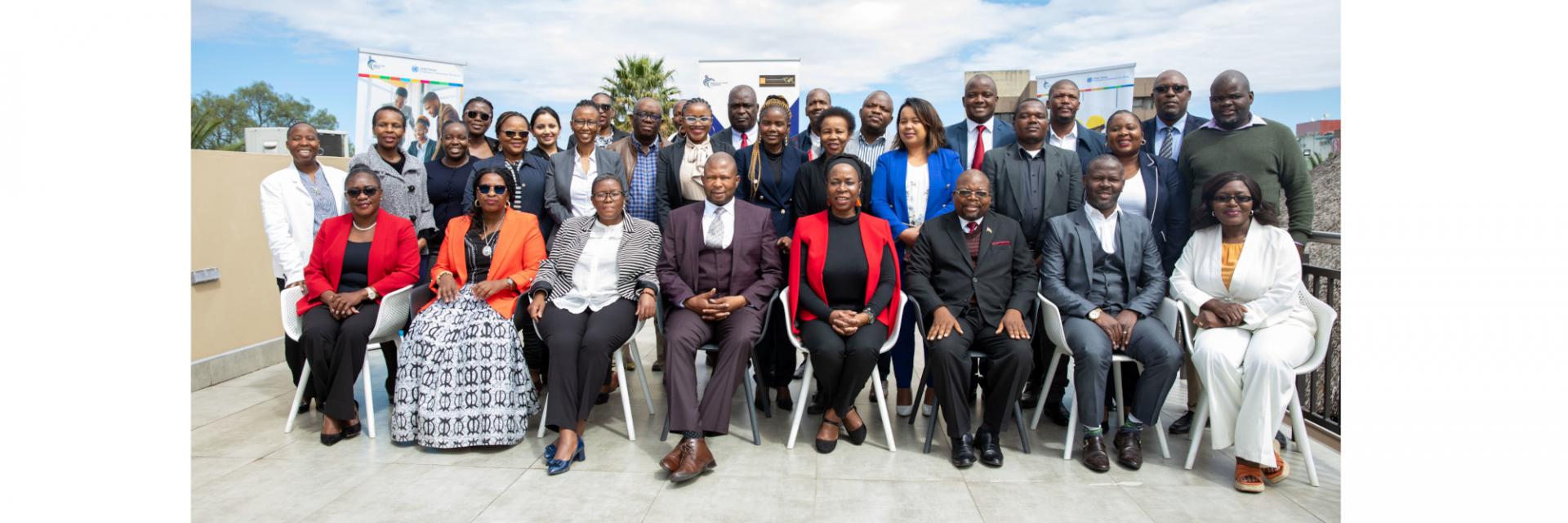Maseru, Lesotho, 17 October 2023 – The Government of the Kingdom of Lesotho in collaboration with the United Nations Economic Commission for Africa (ECA) Sub Regional Office for Southern Africa (SRO-SA) and the United Nations system in Lesotho convened a two-day Regional Policy Dialogue (RPD) to explore the sustainability of MSMEs in Southern Africa through leveraging local content policies (LCPs) and Frameworks.
The main objective is for regional member states and other stakeholders to share their experiences on utilizing LCPs and frameworks in supporting development. Furthermore, the dialogue will assess the alignment and harmonization of regional and national local content policies and frameworks in Southern Africa; interrogate on the policy and regulatory requirements on regional value chains and LCRs in terms of enablers and barriers in supporting MSMEs active involvement along the value chains.
Officiating at the meeting, the Principal Secretary, Ministry of Trade and Industry, Business Development and Tourism, Mr. Pokello Mahlomola, highlighted that the strategic approach to Micro, Small and Medium Enterprises (MSMEs) development must focus on enhancing their survival rates through tailored training programs, facilitating access to information, improving financial accessibility, creating favourable fiscal policy environments, and assisting in the adoption of modern technology.
The Principal Secretary lauded ECA for its continuous support to the Government of the Kingdom of Lesotho in various recent interventions including; the National Industrial Policy Review, drafting of the National Minerals and Mining Policy, the Response to the COVID-19 pandemic, the Ratification of the Agreement establishing the African Continental Free Trade Area (AfCFTA), Development of the National Spatial Framework on Gender Issues, and on the Measurement of GDP of the City of Maseru.
Speaking at the same event, Ms. Olayinka Bandele, Chief, Inclusive Industrialization ECA, speaking on behalf of ECA SRO-SA Director, Ms. Eunice Kamwendo, said that LCPs and Frameworks offer opportunities in support of the development of domestic MSMEs. She noted that globally, an increasing number of countries have introduced or reinforced LCPs with a view to stimulate the use of local factors of production, such as labour, capital, supplies of goods and services, to create value in the domestic economy and hence expand the industrial sector and linkages. She noted that, a study by the World Bank in 2023 found that LCPs can increase access to finance for MSMEs by up to 20% and that earlier in 2021 the International Labour Organization reported that local content policies can improve the skills of MSMEs by 15%. She further noted that in another study, the African Development Bank observed that, local content policies can increase access to markets for MSMEs by up to 10% while the United Nations Industrial Development Organization in 2019 found that local content policies can promote the development of local industries and supply chains by up to 5%”.
She emphasised that a focus on delivering a successful local content policy and its supporting regulatory framework has the potential to support the following economic development aims: export diversification; import substitution; an improved national forex position and therefore debt sustainability.
“When delivered at scale; LCP creates an enabling environment for private sector development; value chain development and mapping into GVCs; gender economic empowerment; improved productive capacity; and improved export readiness of participating MSMEs” she added.
Ms. Bandele observed: “that while that LCP is not a panacea for all ills of an economy, however, it is a proven robust strategy when deployed effectively. At ECA SRO SA, we are keen to support countries in Southern Africa to transform their economies through the benefits that accrue from utilization of LCPs and Frameworks”.
Speaking when he presented an overview on the Conceptual Framework on LCPs, ECA Consultant, Professor Albert Makochekanwa, noted that local content policies that do not result in the expected level of procurement from local manufacturers undermines the industrialisation process and job creation.
He said that “Without active interventions to address the constraints on low levels of local content, domestic producers will be disadvantaged and will not have the opportunity to improve their capabilities and capacity.”
Professor Makochekanwa further stressed: “with clear procurement timelines and standards and an assurance of domestic demand, local producers would be in a position to increase, improve and modify their capacities and capabilities to match specifications and compete more effectively”.
The RPD is being attended by policymakers and experts from the 10 out of 11 member States of the SRO-SA drawn mainly from relevant government ministries, departments and agencies on Industry and Trade, Non-governmental Organizations, and development agencies.
Issued by:
The Sub-Regional Office for Southern Africa
UN Economic Commission for Africa (ECA)
P.O. Box 30647, Lusaka, Zambia.
Media Contacts:
Mr. Bedson Nyoni
Senior Information Management Assistant
Economic Commission for Africa Office for
Southern Africa (ECA-SA)
Email: nyonib@un.org

